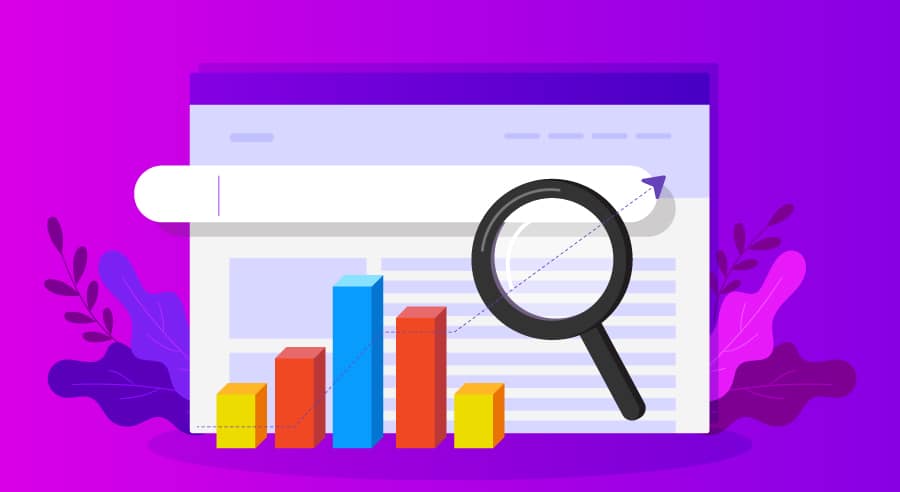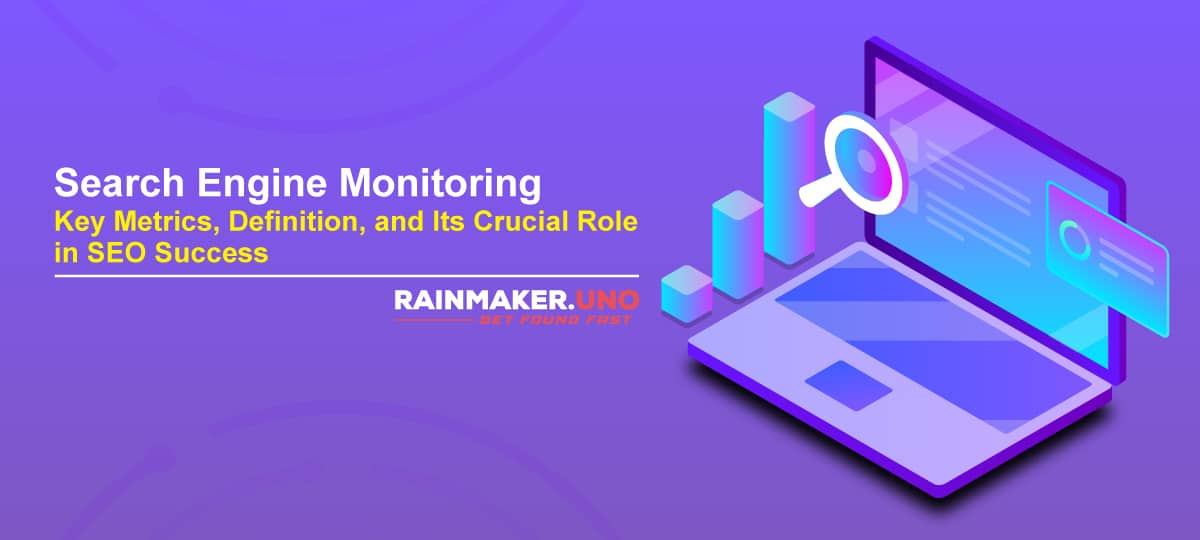Monitoring keyword rankings, organic traffic, and other significant metrics allows businesses to upgrade their SEO efforts and adapt to the dynamic marketplace.
It helps businesses seize new opportunities by proactively covering and resolving potential issues.
Incorporate search engine monitoring in your marketing practices to promote your online business and take it to the next level.
SEO is the backbone of digital marketing.
A report by BrightEdge shows that 68% of all online experiences start with a search engine. This demonstrates the importance of ensuring organic traffic flow and enhancing online visibility for online business concerns.
While integrating SEO into marketing strategies is key, measuring performance is vital to maintaining business growth.
Analyzing SEO metrics helps improve a website’s general performance by providing data-driven insights into what to optimize. This improves user experiences and increases visibility in search engines.
What SEO metrics should you consider, and how should you evaluate them accurately?
We’ve got you!
This comprehensive blog discusses search engine monitoring, key metrics, how they affect SEO success, and everything you need to know to implement SEO effectively on your websites.
What Is Search Engine Monitoring?

Search engine monitoring refers to analyzing marketing campaign performance and results.
It ensures you cover all essential SEO metrics, such as keyword ranking, user engagement, bounce rates, page load speed, etc., to optimize your campaigns for higher conversion rates.
Let’s understand it better with an example.
Imagine an online retailer selling eco-friendly products noticing a sudden drop in keyword ranking for “sustainable fashion” using search engine monitoring tools. Upon monitoring other key metrics, they realized it was due to recent algorithm updates.
They quickly updated their content, optimized keywords, and fixed technical issues to restore their visibility in search engine results.
Hence, search engine monitoring helps you stay ahead of any potential problems that might harm your rankings and brand image.
Key Metrics in Search Engine Monitoring

Although the core business goals focus on revenue, expanding market value, and driving sales, analyzing the following key metrics is crucial for a comprehensive understanding of your SEO performance.
Organic Traffic
Organic traffic refers to users with search intent who visit your website through search engines like Google instead of coming through paid ads or direct links.
It is one of the most essential metrics of search engine monitoring, as it shows your website’s ranking based on relevant keywords.
High-volume organic traffic suggests that a website is fully optimized, serves user needs, and has strong search rankings.
You can monitor organic traffic using tools like Google Analytics or Semrush to spot your site’s total number of visitors, their sources, and keyword performance.
Keyword Ranking
Tracking keyword ranking indicates how well your SEO campaigns are doing by providing reports on current organic market shares and growth opportunities.
Cover branded and non-branded search terms in your keyword research.
Branded keywords target customers with buying intent and are crucial for your brand image. On the other hand, non-branded keywords like “men’s sports shoes” guide potential customers in their shopping journey and help them make decisions.
You can use different online tools like Ahrefs and Moz to track your keyword ranking on SERPs.
Click Through Rates
Click Through Rates refer to the number of people who click on your website to visit it.
Writing compelling title tags and meta descriptions can help if you rank well in search results with low CTR.
The title tag is a headline about the content of your page, while the meta description broadly describes your page.
Relevant, engaging, keyword-rich title tags and meta descriptions can boost your CTR and drive more organic traffic to your website.
It is also important to monitor the CTR, which signals the relevance of your results to the user, thus enabling updating any presented in the search results. For that, you can use Google Search Console to track your website’s overall CTR, particular pages, and keywords to get a detailed analysis of your SEO strategies.
Page Speed And Core Web Vitals
Google insists on speedy page loads, which enhance the user experience and raise conversion rates.
So, Google introduced Core Web Vitals in 2020, which analyzed the performance of loading pages in depth. Since then, it has been among the critical elements of search ranking.
Core Web Vitals usually deals with interactivity, loading issues, and visual stability and consists of:
- Largest Contentful Paint (LCP)
- First Input Delay (FID)
- Cumulative Layout Shift (CLS)
You can monitor these elements and overall site performance using Google Search Console’s “Enhancements” feature or Google’s PageSpeed Insights.
Crawling
Once Google indexes your site, you can request a URL Inspection Tool to edit your pages.
With recrawling, you can help Google spot these edits and rank your website appropriately.
There are various SEO monitoring tools to track how search engine bots interact with your site. For instance, Google Search Console shows how many pages Google has crawled in the past 90 days, giving you an overview of your marketing campaigns.
Google crawls have limits to how often and which pages are crawled. This means you can limit how frequently Googlebot crawls your site, if it slows down your server, or if there are too many requests per second.
Backlink Profiles And Referring Domains
Backlinks are among the most important algorithm factors that decide how Google ranks your website.
A survey done on 11 million Google search results shows an evident connection between higher rankings and the number of unique referral domains.
Backlinks refer to external links that direct traffic to your website, while the referring domain shows the sources of these links.
Always prefer quality over quantity, as ten backlinks from a credible source are more effective than 100 links from a non-reputable source.
Although every backlink boosts your SEO efforts, the links from new referring domains are more impactful than the repeated links from the same domain.
To manage your backlinks, tools like Ahrefs allow you to identify which sites are linking to you, the particular pages they are linking to, and the credibility of those referring domains.
Popular SEO Monitoring Tools

The right tools to monitor SEO campaigns are essential for successful marketing. Here are some highly recommended tools to increase the efficiency of your marketing efforts:
Google Analytics
Google Analytics is a perfect solution for running web analytics and SEO activities. It comprehensively reports your site’s traffic flow, user behavior, and conversion patterns.
This free tool is easily installed and lets you track important metrics like bounce rate and site speed to enhance user experience and improve online business results.
Google Search Console
Google Search Console is a free tool that can help you improve a website’s total performance in search results by highlighting potential problems, tracking keyword rankings, and more.
It also increases your website’s visibility through searches and improves organic search results using its very user-friendly interface and accurate insights.
Ahrefs
Ahrefs is an exclusive tool for backlink analysis, keyword research, website health monitoring, and competitor analyses.
It gives your business the edge it needs with website audits and link-building opportunities that help improve your online rankings.
Semrush
Semrush is a robust tool for tracking keyword rankings, carrying keyword research with search intent analysis, and analyzing backlinks.
Its extensive SEO monitoring and auditing capabilities make analyzing your competitor easy, improving your business’s marketing performance.
Moz
Moz offers strong domain authority metrics and robust on-page optimization tools to enhance your content’s search engine rankings.
It helps you to target high-value keywords for better online visibility. Its user-friendly interface helps optimize your online presence and boost traffic to your website.
Long-Term Benefits Of Search Engine Monitoring

Search engine monitoring addresses emerging issues by tracking the website’s metrics, boosting customer experience, and supporting ongoing business growth.
Here are some long-term benefits of analyzing your site performance through search engine monitoring:
- It ensures your website’s positive SEO health by detecting issues like crawling errors, broken backlinks, and slow loading time.
- Encourages quick adaptation to search engine algorithm changes and helps businesses optimize their marketing strategies based on the updated guidelines.
- Regular monitoring helps sustain website rankings by identifying trends, optimizing content, and staying ahead of competitors.
- It contributes to long-term business growth by driving sustained traffic to your website.
